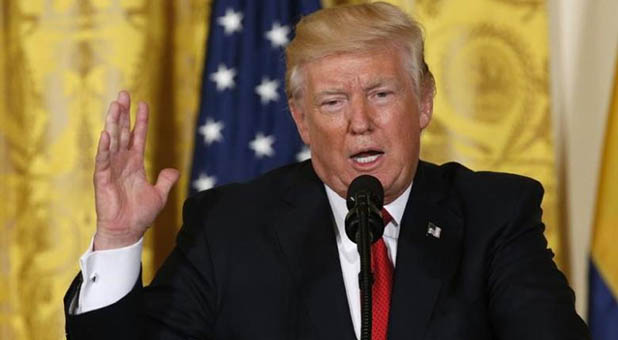By any standards, it was an extraordinary week for U.S.-Israel relations—and that was before President Donald Trump even arrived in Israel for his official visit.
It began with what sounded like a brawl between American and Israeli officials laying the groundwork for Trump’s May 22-23 visit. Irritated by an Israeli request that Prime Minister Benjamin Netanyahu accompany Trump on his visit to the Western Wall in Jerusalem—an image that would send the unmistakable signal that the new U.S. administration regards a united Jerusalem as Israel’s eternal capital—David Berns, a political counselor at the U.S. Consulate in Jerusalem, reportedly responded that the Jewish holy site is in fact “part of the West Bank.” The Israelis were stunned and said as much to the White House; by the end of the day, the White House had clarified Berns’ comment did not reflect “the position of the administration” on Jerusalem’s status.
But what is the position of the administration? More confusion on this point came the following day. At a press briefing on Trump’s itinerary in Israel, National Security Adviser H.R. McMaster was asked—twice—whether he regarded the Western Wall as part of Israel. McMaster declined to answer the question by describing it as a policy decision.
In the same briefing, McMaster confirmed that “no Israeli leaders” would accompany Trump at the Western Wall, encouraging speculation that the U.S. doesn’t recognize Israeli sovereignty over Jerusalem. McMaster revealed Trump would visit the Yad Vashem Holocaust remembrance center—but only, it was reported later, for 15 minutes—and made no mention of Trump’s much-anticipated speech at the ancient Jewish fortress of Masada, which was ultimately scrapped by the Trump team, reportedly due to logistical and weather challenges.
How, then, did this high-profile spat between longtime allies not dominate this week’s headlines around the world? It’s because this week was also, by any standard, an extraordinary one for U.S. politics in general.
With all the flair of a political thriller, and just hours after McMaster’s comment, Israel suddenly found itself inserted into a story that was tearing its way across the networks, as The New York Times revealed that the deeply sensitive intelligence Trump is said to have shared with Russian officials had originally been supplied by the Israelis. Then came the revelation that James Comey, the FBI chief fired by Trump, had written up the notes of a meeting in which Trump reportedly asked him to drop the investigation into the contacts between former National Security Adviser Michael Flynn and the Russian government—the very issue behind Flynn’s rapid departure from the White House.
The cumulative effect of all this for the Trump administration is terrible, on fronts both foreign and domestic. It suggests, especially to Europeans—even those who tend to give Trump the benefit of the doubt—that all their worst fears about his presidency are coming true, and that the man who roasted Hillary Clinton over her email server is even more careless and indiscreet now that he’s in office. This is not the message Trump should be sending to a continent where public distaste for military action is already widespread and entrenched, particularly when he is simultaneously asking NATO member states to increase their budgetary contributions.
Much the same argument could be made in the context of Japan and South Korea, both stalwart allies currently living under the shadow of the North Korean threat, who are nevertheless deeply nervous about Trump’s ability to handle Kim Jong Un. It might even extend to Israel, whose government seems unable to grasp what Trump’s policy agenda actually is, and whose intelligence services are likely thinking about how to present important intelligence to the Americans in the future—in a sufficiently “Trump-proof” manner.
But this shouldn’t lead us to conclude the U.S.-Israel relationship will end up as one more casualty of Trump’s unprecedented presidency. There is a natural tendency among political journalists to concentrate on the policy flips and hyperbolic statements that make politics so compelling, rather than upon the duller consistencies that make our democratic system more or less reliable. From the latter vantage point, there are some key points worth emphasizing about current American-Israeli ties.
First, Trump isn’t the first president to have waded into a disagreement with Israel. One can think of numerous clashes during the last 50 years, from Ronald Reagan to Bill Clinton to Barack Obama, which the relationship has readily survived.
Second, it’s clear there are a variety of voices within the administration speaking on this issue, with U.N. Ambassador Nikki Haley and Ambassador to Israel David Friedman following up McMaster’s remarks with assurances that, in their view, the Western Wall belongs to Israel. This heightens the insecurity that only Trump knows what he is really thinking (and rethinking), and we should not expect this to change while he’s in office.
Third, it should be remembered that many on the political right in Israel made the mistake of taking Trump’s campaign rhetoric at face value. They might not have been as shocked by this week’s events had they not suffered from these delusions in the first place.
Fourth, does anyone doubt that Trump, once in Israel, will use his showmanship to publicly soothe the rattled bilateral relationship? That his immediate goal is to leave the Israelis asking themselves what they were worried about?
For as long as Trump is consumed by his domestic crisis, it is unlikely a final deal between the Palestinians and Israel will remain anything more than a lofty ambition. But Trump’s crisis doesn’t change the fact that there is a realignment in the region between Israel and the Arab states—and potentially the Palestinians—based on shared interests, from economic development to confronting the Iranian threat. These opportunities really do form the basis for a meaningful peace process—one, moreover, that won’t depend on the fate of a single president. {eoa}
Ben Cohen writes a weekly column for jns.org on Jewish affairs and Middle Eastern politics.
This article was originally published at jns.org. Used with permission.
See an error in this article?
To contact us or to submit an article



















